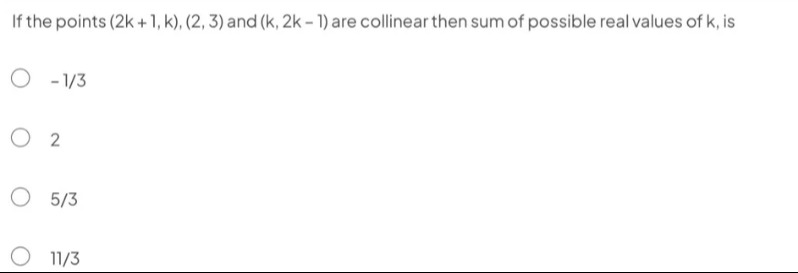Question
Question: If the points (2k + 1, k), (2, 3) and (k, 2k − 1) are collinear then sum of possible real values of ...
If the points (2k + 1, k), (2, 3) and (k, 2k − 1) are collinear then sum of possible real values of k, is

A
-1/3
B
2
C
5/3
D
11/3
Answer
5/3
Explanation
Solution
For collinearity, the area of the triangle formed by the points must be zero. This can be expressed using a determinant:
2k+12kk32k−1111=0Expanding the determinant:
(2k+1)[3−(2k−1)]−k[2−k]+1[2(2k−1)−3k]=0Simplifying step by step:
- 3−(2k−1)=4−2k, so the first term is (2k+1)(4−2k).
- Expanding (2k+1)(4−2k)=8k+4−4k2−2k=−4k2+6k+4.
- The second term is −k(2−k)=−2k+k2.
- The third term is 2(2k−1)−3k=4k−2−3k=k−2.
Combining the terms:
−4k2+6k+4−2k+k2+k−2=0Combining like terms:
−3k2+5k+2=0Multiplying by -1:
3k2−5k−2=0Solving the quadratic equation using the quadratic formula:
k=2a−b±b2−4ac=2⋅35±(−5)2−4⋅3⋅(−2)=65±25+24=65±7Thus, the roots are:
k=612=2andk=6−2=−31The sum of the possible real values of k is:
2+(−31)=36−31=35